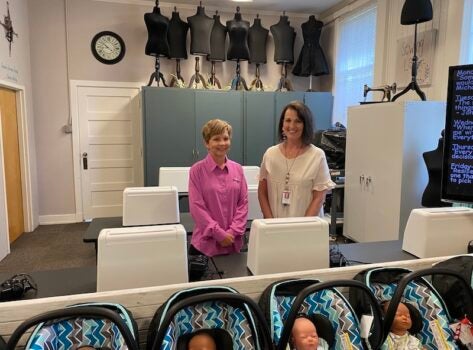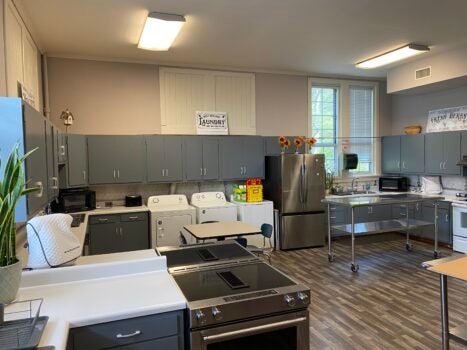Verbena enhancing middle school career tech program
Published 3:35 pm Wednesday, April 24, 2024
|
Getting your Trinity Audio player ready...
|
By Carey Reeder | Managing Editor
Verbena High School was recently awarded a $50,000 grant to expand its family and consumer science program at the school for its middle school students to gain valuable life skills early in life.
The grant was offered by the State Department of Education and is designed to be used for career tech middle school expansion. The grant gave the options to either start a career tech middle school program, or expand upon one that is already in place. Verbena family and consumer science (FACS) teacher Debbie Clark already had a program in place, so the grant was used to expand the program and add equipment that will enhance the program’s curriculum.
Dr. Shannon Walker, Chilton County Schools Career Tech Supervisor, met with Clark to discuss what she needed for the FACS program at Verbena, put together the budget and included plans for purchases if the grant was secured. Walker took Clark’s input, and she crafted the grant for Verbena that was chosen as one of the awarded schools.
“(Debbie) had a lot of equipment that was not working and out of date, and we always want to provide our kids with the most up-to-date equipment that is out there so they can train on the new equipment,” Walker said.
The grant stated that each purchase made with the funds had to be sustainable, and there had to be a way to preserve the new equipment and gadgets for generations of students to come. Verbena middle school students will be the only users of the new equipment as part of their course that has many standards that introduce them to different career fields. Now, the program can introduce them to those fields, and give them experience in them as well.
“The thought process is that we want our seventh and eighth graders to start thinking about what they want to do and what they want to get out of school, and that is hard when you are that young,” Clark said. “One of the things I have noticed teaching middle school kids is they have to feel good about themselves, and they have to feel confident in everyday things so they can move on to bigger and better things. We really wanted to focus on introducing them to a lot of careers, helping them to learn ‘adulting’ and helping them feel good about taking care of themselves and doing things.”
Some of the items purchased with the grant funds included practice babies and carriers, new kitchen appliances and supplies, furniture, dress forms and other school supplies. Clark said that the middle school students enjoy sewing, and a portion of the funds went towards purchasing around 10 new sewing machines, fabrics and other sewing equipment to continue expanding those lessons in the program. She added that fashion goes in many different directions, and expanding the sewing lessons will give students a wider variety of possible career paths to explore.
The school also has a business that is run by eighth-grade students selling hot chocolate in the mornings, and the proceeds raised goes back towards the FACS program at Verbena. It also has a boutique in the school where students learn how to separate clothing, tag items and create a shopping environment, all among the career tech lessons the FACS program at Verbena will be able to enhance because of the grant funds.
“They are learning a lot of everyday skills, and we take those everyday skills and teach them how it can apply to bigger things,” Clark said. “We are so fortunate and blessed, and it makes our kids feel good too. Sometimes they might feel a little forgotten, but they are not. The kids are so excited, and it is fun to see them excited because to them, it was a win for them. They understood that it was coming back to them.”
A portion of the grant needed to have a STEM aspect tied to it, so Clark and Walker purchased new Chromebooks and two virtual reality headsets with the funds. The students use a program called Career Explorations with the virtual reality headsets, and after updating the program following the grant, students will be able to explore over 50 different careers to work in while also getting a virtual reality experience in the job.
“It is only a few minutes of different things, but it really gives you an aspect of it,” Clark said. “They are super excited about everything, and we are excited for them because sometimes in a rural area, it is hard to see outside the box. We want them to be able to see outside the box, and even in this area they may not know some of things that are available to them. That is our goal — to help them realize they can achieve these things, and they are not out of their reach.”








